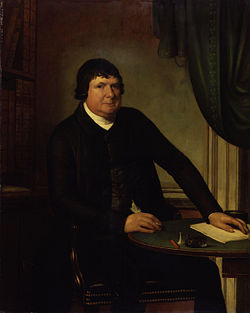William Huntington (preacher)
| William Huntington S.S. | |
|---|---|

William Huntington by Domenico Pellegrini
|
|
| Born | 2 February 1745 Four Wents, Cranbrook, Kent |
| Died | 1 July 1813 Tunbridge Wells, Kent |
| Education | Dencen Free Grammar School |
| Occupation | Preacher and coalheaver |
| Spouse(s) | Mary Short (1769–1806) Lady Elizabeth Sanderson (1808–1813) |
| Children | John Fever |
| Parent(s) | Elizabeth Hunt and Barnabus Russel |
William Huntington S.S. (2 February 1745 – 1 July 1813) was an English preacher and . He is said to have preached that the 'moral law' was unnecessary, a theological view known as Antinomianism, although his writings, sermons and letters do not bear this out. Huntington was a strict Calvinist who believed some were predestined to be saved and some were not. He was also convinced that he would be identified as a true prophet on Judgment Day. His unusual, polemic style of preaching and writing made him popular but brought conflicts with other preachers throughout his life. He founded or opened chapels throughout England, many of which survive.
William Huntington was born in 1745 near Cranbrook in Kent, and was given the name William Hunt at his baptism there five years later. It is said that his father was Barnabus Russel—his mother's husband's employer—despite his mother's marriage to William Hunt. He was the tenth child of Elizabeth Hunt and the only male to achieve maturity. He had an unsuccessful romance with Susannah Fever, from which a child was born. He left the Kent area and changed his name. Now William Huntington he was free from his financial obligation, but not his conscience. He changed his surname to Huntington in 1769; his rationale was that the "ing" represented the present participle in words representing sinful activities, such as "stealing" and "swearing"; and "ton" referred to his being "a vessel of the Lord". Later that year, he married Mary Short, a servant; they moved to Mortlake in Surrey and Huntington resumed his gardening work. Nevertheless, he was still very poor.
He did attend a number of schools, but it was always as a result of charity. He said himself that he was frequently hungry. He was the son of a farm worker and he undertook work that was unskilled or semi-skilled, such as driving hearses and coaches, gardening and heaving coal. He also spent some time as a tramp.
In 1773, Huntington and his wife moved to Sunbury-on-Thames in Middlesex. Soon afterwards he reported that he had been contacted by Christ. The vision, which appeared as a bright light from which Christ's bloodied body emerged, told him that he was brought under the covenant love of God's elect. He became dissatisfied with his existing religious beliefs, and began to associate with Baptists, Methodists and Calvinists in various Surrey and Middlesex towns. He became known locally for his Biblical knowledge and preaching, and he established his first congregation at Thames Ditton in Surrey, where he was a Baptist. He then had an independent group in Woking, also in Surrey. By the 1780s, Huntington preached at a large circuit of chapels across Surrey, Sussex and London; for example, he was involved in the early days of Bugby Chapel, a Calvinistic chapel founded in 1779 in Epsom. His ongoing poverty, exacerbated by the loss of his coalheaving job, forced him to walk long distances every week. He controversially claimed that Divine Providence alleviated his poverty at this time by occasionally supplying money, food and a horse.
...
Wikipedia
